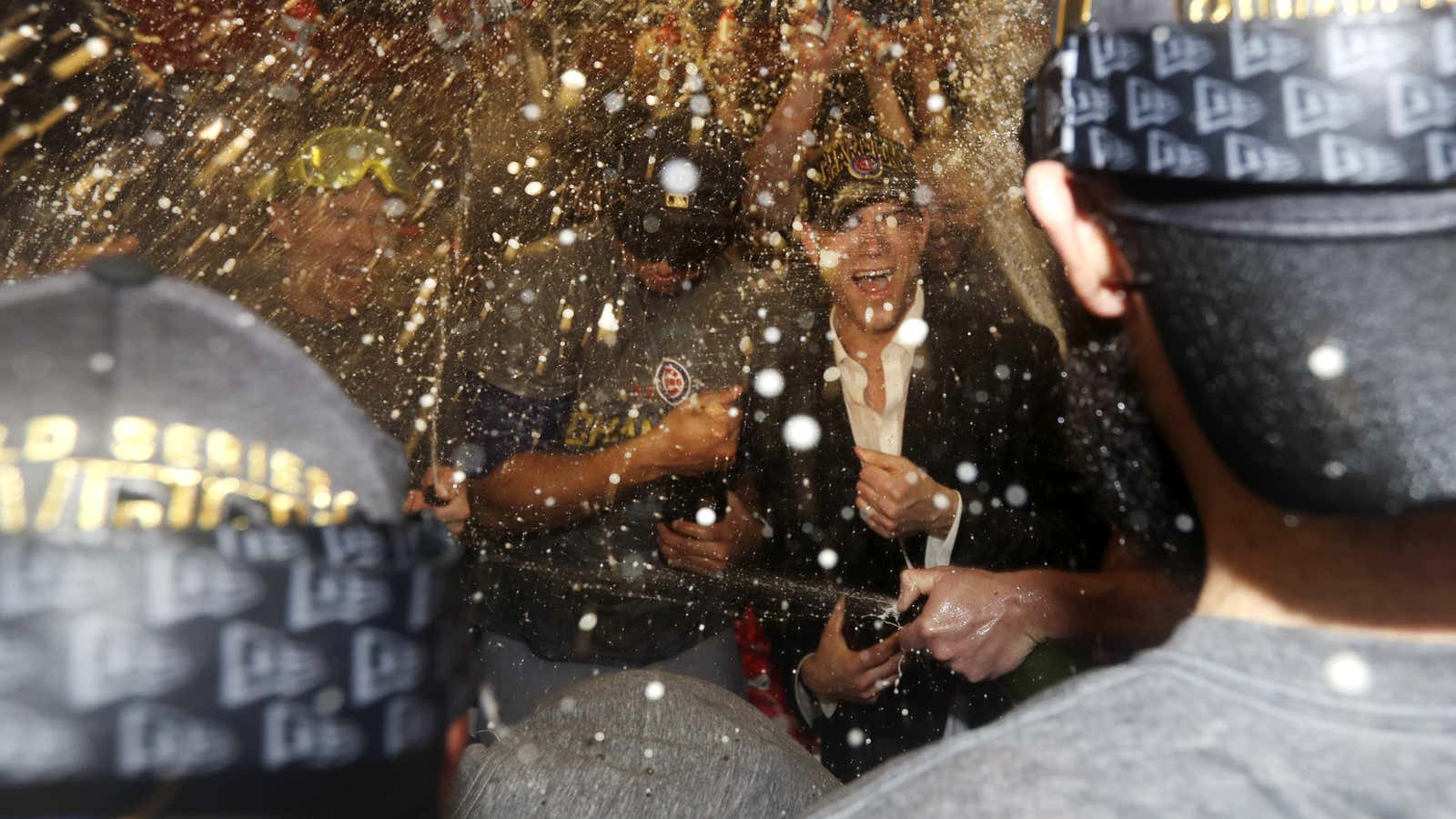If Theo Epstein were a Game of Thrones character, he’d be known as Theo of House Epstein, First of His Name, the Unequaled, King of the Cubs, Khalasar of the Great Grass Diamond, Breaker of Curses, and Rescuer of Heartbroken Fanbases.
He’s not, of course. He’s very much a real person with a boring, normal name (I should know, though I’m no relation). But last night the Chicago Cubs’ president of baseball operations became the closest thing modern-day America has to a savior king, when he engineered the team’s first World Series championship in 108 years. And that was the second time he helped break an indomitable, century-long sports curse.
Epstein also offered Americans a much-needed reprieve from an ugly presidential election last night, as 40 million people watched the Cubs defeat the Cleveland Indians in game seven of the World Series, ending the longest championship drought in American sports history. The team last won a title in 1908, when the Dow Jones Industrial Average was 63. (Today, it’s around 18,000.)
Cubs fans have long believed they were cursed. Theo Epstein, however, doesn’t believe in curses.
In 2002, Epstein, then a 28-year-old Yale graduate, was hired as the general manager of the Boston Red Sox, becoming the youngest person ever to hold the position. (A GM’s goal is to assemble the best team possible, by making trades, signing free agents, developing prospects, assessing scouting dossiers, hiring coaching staff, etc.) Epstein, whose analytical mind was revered despite his lack of experience, had a monumental task before him. The Red Sox, with its legendary “Curse of the Bambino,” hadn’t won a World Series in 86 years.
Two years later, they did. And then they won it again in 2007. Epstein left Boston in 2011 to join the Chicago Cubs as its president of baseball operations—a vague title that gave him virtually complete control over the team’s roster.
Turning around the Cubs was a tall order—the Red Sox were already a strong team when Epstein arrived, but the Cubs had lost 91 games the year he took over, and had lost more than 90 games five other times in the last 14 seasons. But if anyone could end the Cubs’ 108-year long drought, it was Epstein, who had just proven he could take a fallen franchise out of a deep darkness and into the light.
And, well, you know what happened next.
Epstein comes from a family of great writers. His grandfather and great uncle co-wrote the Oscar-winning screenplay to Casablanca, one of the greatest films ever made. His father is a novelist and heads the creative writing program at Boston University. His sister is a television writer, and has penned episodes for Homicide: Life on the Street, In Treatment, and The Affair.
But Epstein’s destiny led him down a different path. After graduating from Yale, he landed a public relations job with the Baltimore Orioles. He leveraged that into a job with the San Diego Padres, while simultaneously earning a law degree. He became the team’s director of baseball operations and then followed team president Larry Lucchino to Boston. The rest, as they say, is now history.
General managers, today, look and act more like mathematicians or bankers than former ballplayers. Epstein’s success with the Red Sox helped usher in a new era of baseball management, one steeped in data. Epstein made a name for himself by making bold decisions (like trading Red Sox fan favorite Nomar Garciaparra) and identifying young talent that no one else could.
His analytical methods were unconventional at the time—he hired Terry Francona, a manager who led the Philadelphia Phillies to four straight losing seasons, to turn around the Red Sox’s fortunes. Francona, now the manager of the Indians, is one of the best coaches in baseball.
Epstein approached baseball more like a business than a game, hoping to suss out which players added value to his operation and which didn’t. Some have argued that philosophy has taken the fun out of sports, but try telling that to Red Sox or Cubs fans.
Of course, Epstein didn’t break either curse alone. He would agree that most of the credit should go to the actual players—the Anthony Rizzos, the Kyle Hendrickses, the Kris Bryants, the Jon Lesters—who performed at championship caliber on the field (along with manager Joe Maddon). But Epstein was the one who signed these men, scouted them, traded for them, hired them. The Chicago Cubs are his tapestry, and the 2016 World Series his greatest work of art yet.
It’s tough to grasp just how good at building baseball teams Epstein really is. Most in his field would be lucky to make it to just one world series in their careers. Epstein has made it to—and won—three, and all before he turned 43. The closest comparison in business might be Steve Jobs, whose singular vision for Apple turned the teetering company into a global superpower.
Epstein is in tune with the game of baseball on a level we may never truly understand. Perhaps he doesn’t really understand it either. Imagine being the savior of not one, but two sports franchises. Imagine ending 194 years worth of fans’ suffering. Imagine reaching the absolute pinnacle of your profession eight years before you qualify for AARP.
What Epstein does understand, though, is what it means to carry the weight of millions of people’s hopes and dreams on your shoulders. And he understands that sometimes, a man deserves a drink.
